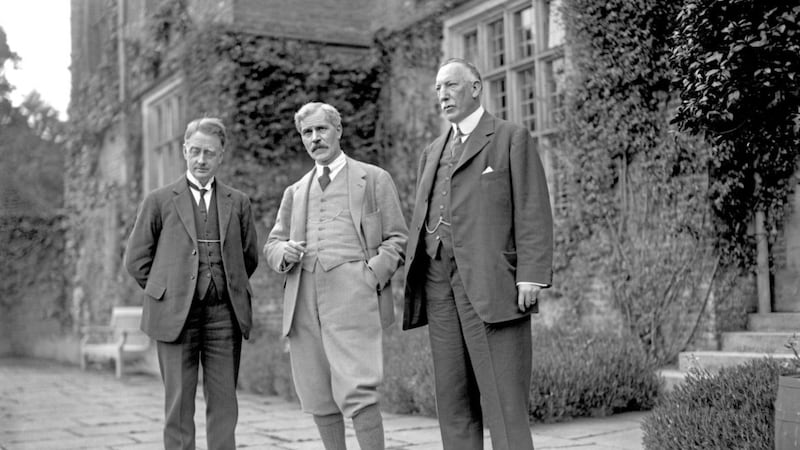The Boris bridge (or tunnel) has made headlines again with publication of the interim union connectivity review. However, review chair Sir Peter Hendy merely covered himself by referring the idea to two engineers for a feasibility study.
The review itself does not recommend a fixed link across the North Channel. It does recommend better road and rail connections within Northern Ireland and to the North West specifically, following a submission from the Into the West campaign group. The review also proposes improved all-Ireland links and an upgrade of the roads out of Stranraer. Johnson singled out the Stranraer scheme for praise in a follow-up newspaper article, in which he did not mention a bridge or tunnel.
SDLP leader Colum Eastwood is the MP for Foyle. All he could manage in the Commons was jeering at the bridge, enabling Johnson to rebuke him for ignoring the review’s potential for his constituency. Stormont’s infrastructure minister is the SDLP’s Nichola Mallon, who will only complain the review ‘centralises’ spending.
The SDLP needs to stop being triggered by a hypothetical symbol and start chasing the serious money on offer for serious projects.
**
There is a genuine political problem with the connectivity review and the government’s overall ‘levelling up’ agenda. It causes UK-wide projects to intrude on devolved policy areas, in this case transport. Scottish and Welsh nationalists are as upset about this as the SDLP. Countries such as the United States have clearly delineated concepts of federal and state infrastructure funding and there is a strong case for the UK needing the same. London is not proposing to build roads and railways in Northern Ireland over Stormont’s head - there would be detailed engagement. But clarifying where this fits into the devolution settlement in a non-federal union would open a constitutional can of worms, so the notion is being bounced through without proper argument. Of course, Stormont would have a stronger countervailing case if it had a better record of delivery. Suppose London offered extra money for a fast train to Derry, for example, while insisting it manages that spending itself. How many of Colum Eastwood’s constituents would object?
**
DUP MLA Alex Easton has proposed a unionist pact at next year’s assembly election. This is almost certainly party-approved kite flying - Easton is a loyal backbencher and the DUP has great hopes of him becoming the next MP for North Down. A pact might make sense for that goal, as multiple unionist candidates split the vote in first-past-the-post Westminster elections. In proportional representation assembly elections, the opposite applies: more unionist candidates bring out more unionist voters, who then transfer down the ballot. A wider choice of parties than nationalism is an important reason why unionist support has held up as well as it has. The DUP tends to be a biggest beneficiary, as the largest unionist party. To even consider reversing this advantage is a sign of absolute desperation.
**
The under-reported story of the week was Arlene Foster telling the assembly that Irish language legislation will be presented before the next election, even ending her statement with a cheery “sin é”.
This would be fast delivery by Stormont standards, even allowing for Covid. Other major commitments in the New Decade, New Approach deal are running further behind, with their time-frames stretching out safely until after the election. Foster can expect to be crucified by the TUV as the language legislation progresses, all while wrestling with the DUP’s sea border disaster.
What this means is that the only thing the DUP is more scared of than being punished at the polls is of Sinn Féin walking out and crashing devolution altogether.
**
In last Saturday’s column, blissfully unaware of the following day’s Scottish football match, I suggested that Mother’s Day might be the event to start unravelling Stormont’s lockdown exit plan. This shows how pleasant life is up on my rung of the social ladder. However, all things are relative. In last Saturday’s Times, high Tory columnist Matthew Parris referred to “those typically moderate Northern Irish voters whom wags label ‘Flymo Unionists’ - Protestants with lawns.”
Please. If you don’t have a petrol lawnmower, you’re a Flymo Loyalist.
**
The Good Friday Agreement says: “it is for the people of the island of Ireland alone, by agreement between the two parts respectively and without external impediment, to exercise their right of self-determination”.
Is Sinn Féin breaking this requirement by calling on the US government to press the British and Irish governments to set the date for a border poll? A party ad in American newspapers this week made that demand, although it stopped just short of saying Washington should press for a particular result. However, last year, Mary Lou McDonald said she would ask both the EU and London to advocate a unity vote in a border poll if she were in office in Dublin.
Despite this, some campaigners for a border poll say it would be an external impediment for London to advocate for the union.
I would not consider my vote impeded unless prevented from casting it but it seems inevitable a more complex argument will end up before a judge.









